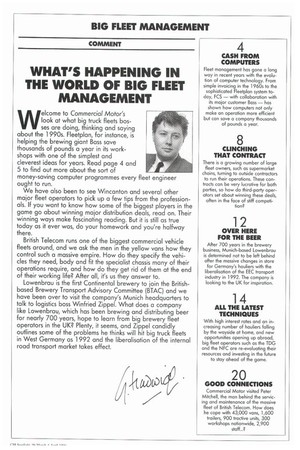WHAT'S HAPPENING IN THE WORLD OF BIG FLEET MANAGEMENT
Page 53

If you've noticed an error in this article please click here to report it so we can fix it.
Welcome to Commercial Motor's look at what big truck fleets bosses are doing, thinking and saying about the 1990s. Fleetplan, for instance, is helping the brewing giant Bass save thousands of pounds a year in its workshops with one of the simplest and cleverest ideas for years. Read page 4 and 5 to find out more about the sort of money-saving computer programmes every fleet engineer ought to run.
We have also been to see Wincanton and several other major fleet operators to pick up a few tips from the professionals. If you want to know how some of the biggest players in the game go about winning major distribution deals, read on. Their winning ways make fascinating reading. But it is still as true today as it ever was, do your homework and you're halfway there.
British Telecom runs one of the biggest commercial vehicle fleets around, and we ask the men in the yellow vans how they control such a massive empire. How do they specify the vehicles they need, body and fit the specialist chassis many of their operations require, and how do they get rid of them at the end of their working life? After all, it's us they answer to. Lowenbrau is the first Continental brewery to join the Britishbased Brewery Transport Advisory Committee (BTAC) and we have been over to visit the company's Munich headquarters to talk to logistics boss Winfried Zippel. What does a company like Lowenbrau, which has been brewing and distributing beer for nearly 700 years, hope to learn from big brewery fleet operators in the UK? Plenty, it seems, and Zippel candidly outlines some of the problems he thinks will hit big truck fleets in West Germany as 1992 and the liberalisation of the internal road transport market takes effect.




































































































































































